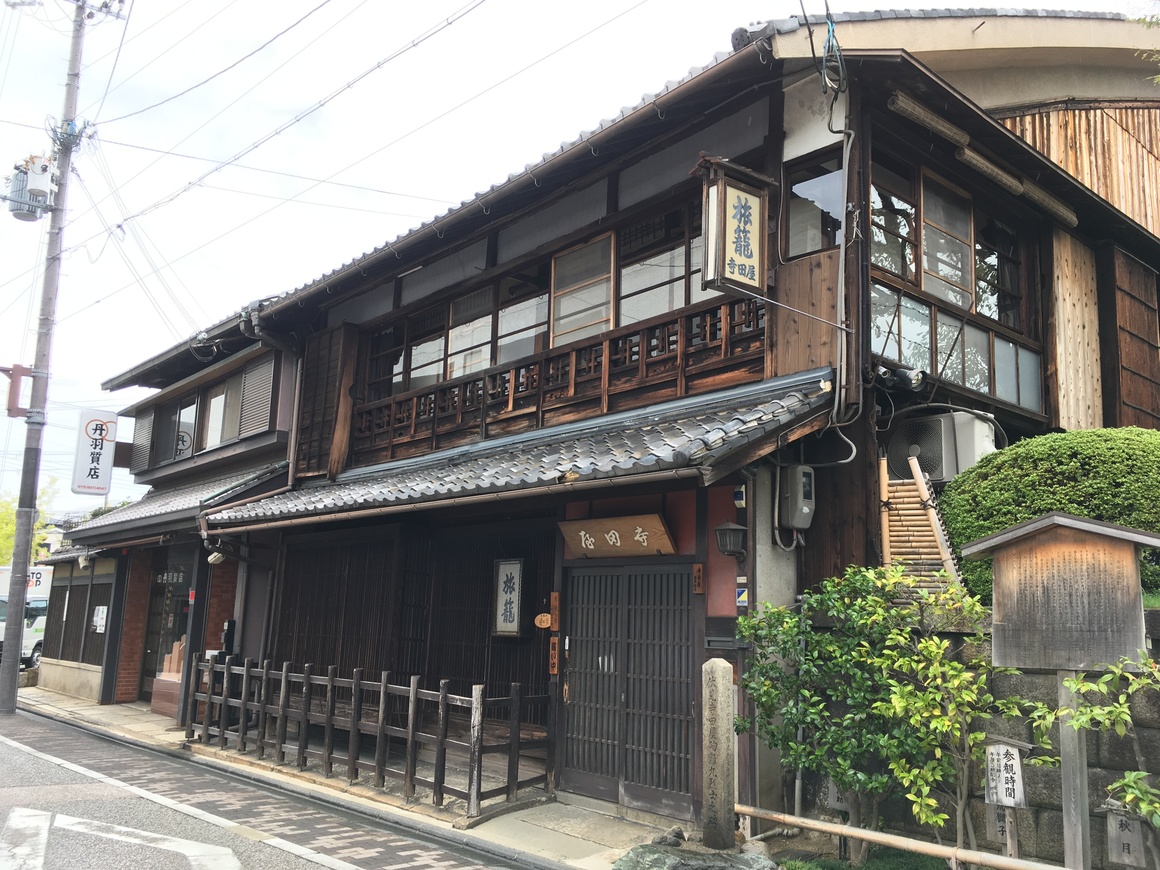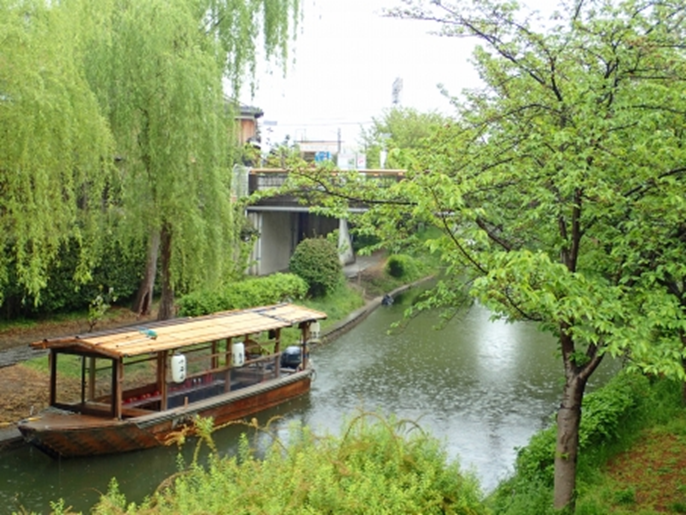
Vol.5
STROLLING THROUGH FUSHIMI’S BEAUTIFUL LANDSCAPES WITH DELICIOUS SAKE
2018.09.14
Southern Fushimi
GOKOUNOMIYA SHRINE/御香宮神社
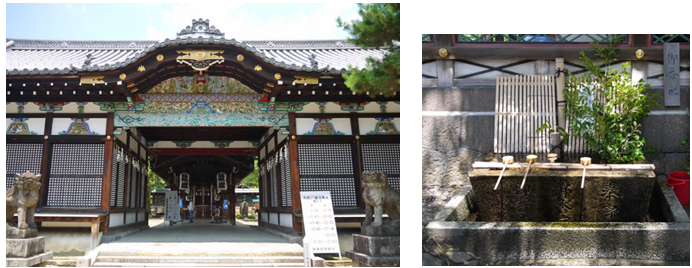
According to legend, long ago, a fragrant spring appeared in this spot, and the emperor at the time named it “Gokounomiya” which means “good smell” in Japanese. The spring water in the garden of this shrine has been selected by Japanese Ministry of the Environment as particularly high quality water, and you can drink it here, too. Why not try the water here for yourself?
Open: 9:00 a.m. - 4:00 p.m.
Access: 5 minutes walk from Kintetsu Kyoto Line Momoyama goryou-mae Station
5 minutes walk from Keihan Line Fushimi Momoyama Station
KIZAKURA KAPPA MEMORIAL HALL/黄桜記念館
The memorial hall is located next to a brewery.
Here, you can see this sake company’s old TV commercials and learn about the process of making sake with
storyboards, all while enjoying the retro atmosphere. You can also taste and compare 3 different types of
sake for a fee.
Open: Museum 10:00 a.m. - 5:00 p.m. Restaurant Weekdays 11:30 a.m. - 2:30 p.m.(Last order at 2:00 p.m.)
5:00 p.m. - 10:00 p.m. (Last order at 9:00 p.m.)
Shop 10:00 a.m. - 8:00 p.m. Holidays 11:00 a.m. - 2:30 p.m.(Last order at 2:00 p.m.)
5:00 p.m. - 10:00 p.m.(Last order at 9:00 p.m.)
Access: 8 minutes walk from Kintetsu Kyoto Line Momoyamagoryoumae Station
7 minutes walk from Keihan Honsen Fushimi Momoyama Station
Entrance is free of charge
Gekkeikan Okura Sake Museum/月桂冠大倉記念館
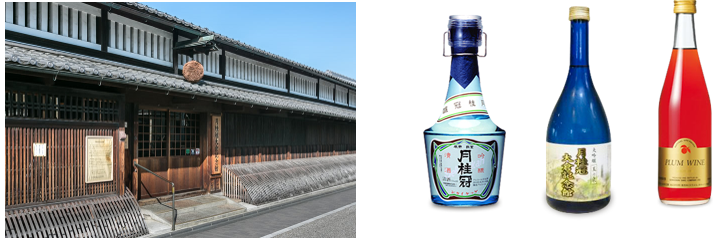
Gekkeikan is one of the most famous sake companies in Japan, and this building was their first brewery. Now, it been rebuilt as a memorial hall and visitors can participate in a sake tour that allows you to see the sake-making process. After the tour you can try of 3 types of sake.
These are the 3 types of sake you can try.
Click here for more information:
http://www.gekkeikan.co.jp/enjoy/museum/access/
Open: 9:30 a.m. – 4:30 p.m. (Entry closes at 4:15 p.m.)
Admission Fee: 400 yen (Includes one bottle of sake for adults, one postcard for children)
Next, take a break while riding on one of two pleasure boats: the jikkoku-bune, or sannjikkoku-bune/十石船、三十石船.
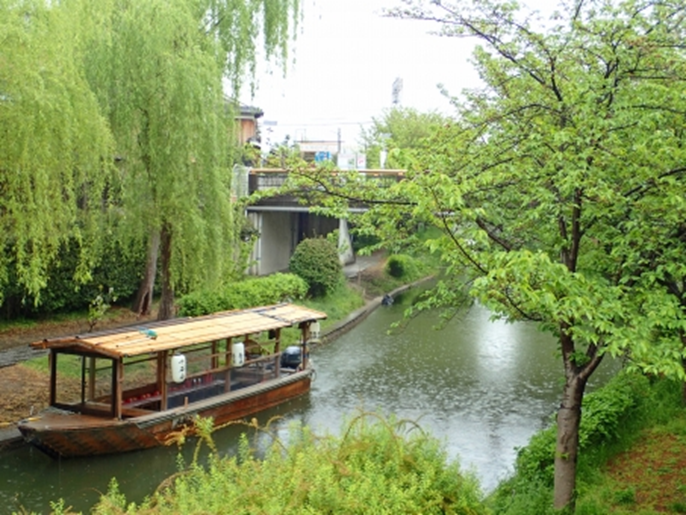
You can float down the Yodo River and enjoy the beautiful green cityscape while riding on these boats. The jikkoku-bune and sanjikkoku-bune were once used to transport people rice, and sake in Kyoto.
See below for the differences between the jikkokus-bune and sanjikkoku-bune.
Access: 10 minutes walk from Kintetsu Kyoto Line Momoyamagoryoumae Station
5 minutes walk from Keihan Honsen Line Tsushojima Station, or 10 minutes walk from Fushimi Momoyama Station
Click here for more details and time tables.
http://kyoto-tabi.or.jp/events/jkkfn/_en/
Teradaya
Inn/寺田屋
This is a famous location for samurai fans[AS6] . Here, Sakamoto Ryoma, a samurai who dreamed of a modern Japan, was almost assassinated. This building used to be a guest house for boatmen, and was burned down once, but has since been rebuilt and now is used as a historic museum.
Open: 9:00 a.m. - 4:00 p.m. (Closed Monday)
Admission Fee: 400 yen
Access: 1 minute walk from City Bus stop Kyobashi
5 minute walk from Keihan Main Line Tsushojima Station
Northern Fushimi
Fushimi Inari Shrine/伏見稲荷大社
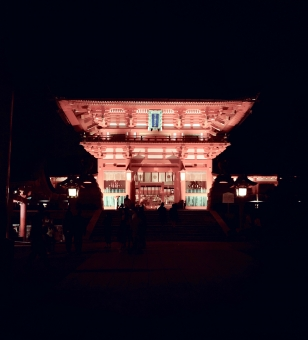
This shrine has become too popular to visit during the daytime if you want to relax, because it becomes completely crowded with people. However, you can enjoy this beautiful shrine better—without any stress, but with much excitement—at night, because the shrine wii be lit up . You can also enjoy a nightscape at “the yotsutsuji intersection” located a 10 minute walk from the shrine entrance.
Adminission Fee: Free
Open: 9:00 a.m. - 4:30 p.m.
Access: Just off JR Nara Line Inari Station
5 minute walk from Kihan Honsen Line Fujinomori Station
7 minute walk from Inaritaisha-mae bus stop on City Bus 5
Fuji-no-Mori Shrine/藤森神社
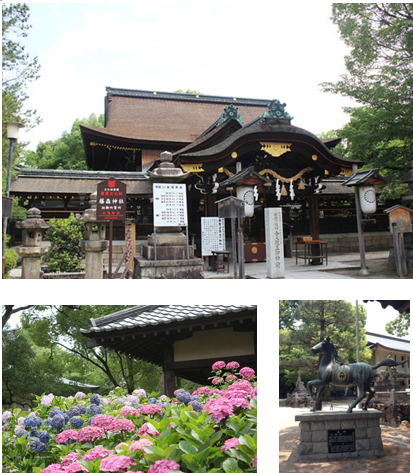
This shrine is regarded as the place of origin of “Shobu no sekku”: Children’s Day in Japan.
Goddess of victory is one of the gods enshrined here. This shrine is known as the
shrine of horses and games, because there are many gods of military arts,
including the Venus of Victory, enshrined here, and the shrine hosts a
horseback archery event. 3,500 hydrangeas bloom in the shrine garden, which is
opened for visitors in June and July.
Open:9:00~17:00
Admission fee:free
Access:7 minute walk from Keihan Main Line Sumizome Station
5 minute walk from JR Nara Line Fujinomori Station
Just off City Bus bus stop Fujinomori Jinja-mae
Jonangu Shrine/城南宮
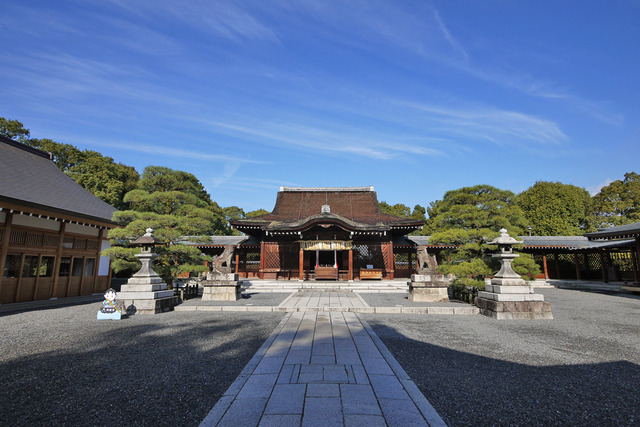
In the Heian Period, approximately 1,200 years ago, the Japanese deity Jonanshin became a guardian deity of Kyoto Imperial Palace. People enshrined this god here as a god for removing calamities related to direction.
Open: 9:00 a.m. - 4:30
Admission Fee:“Rakusuien”/楽水苑 Garden entrance costs 600 yen (For adults)
Access: 15 minute walk from Subway Takeda Station, or Kintetsu Takeda Station
Just off City Bus Jonan bus stop
Copyright © 2015 DAY ALIVE Inc. All Rights Reserved.






